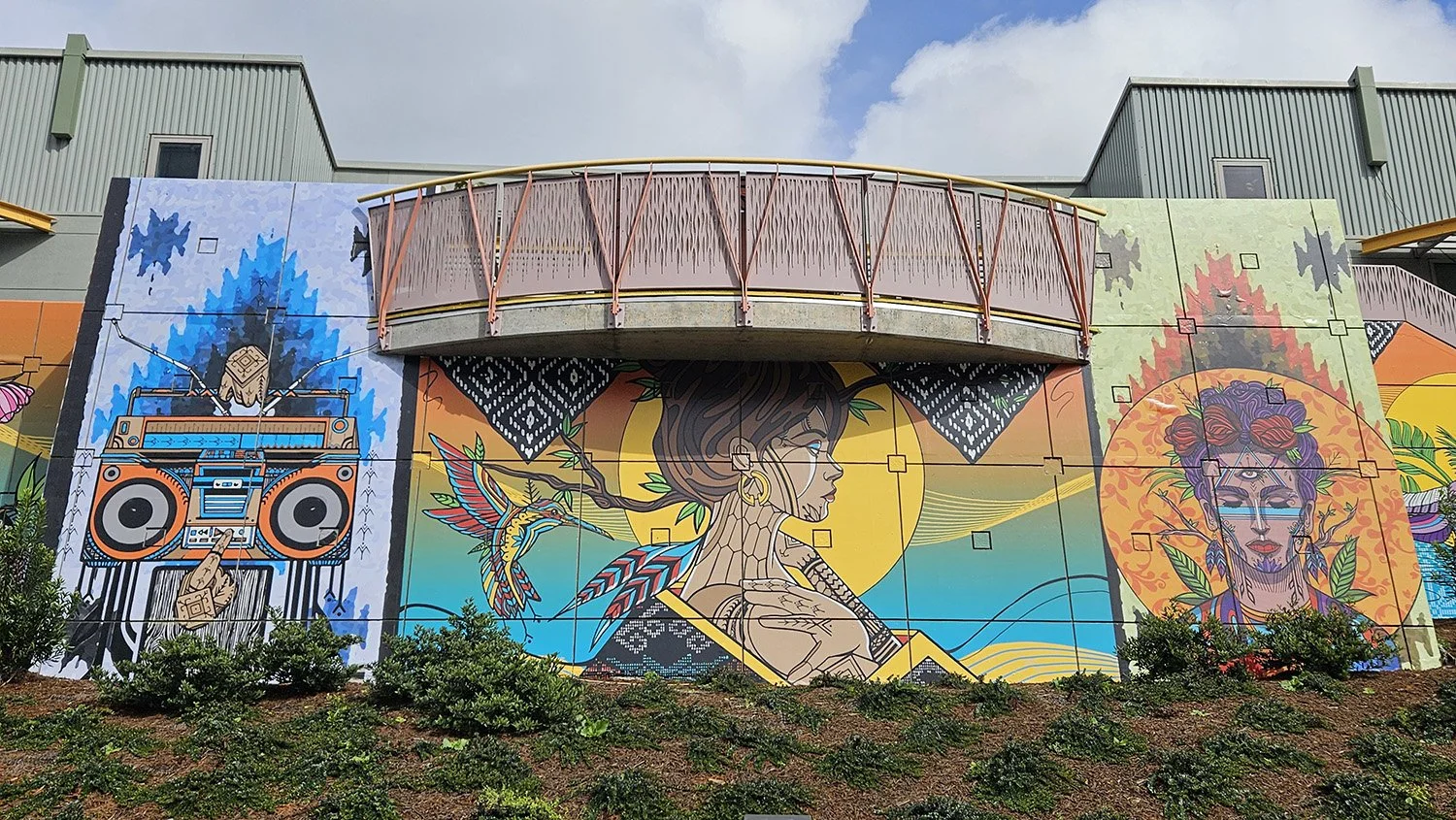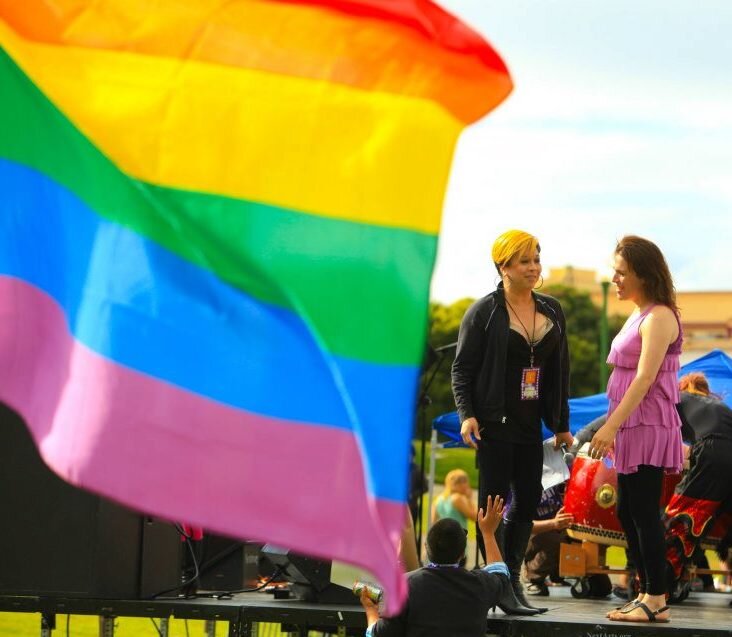Listen to Your ‘Tita Aida’
/Tita Aida
Calma's immigration to the United States from the Philippines is the classic tale of breaking away to find one's place in the world. It was 1989. She was 22. In Manila, she had been given the opportunity to establish herself in show business. Childhood friends who were active in the industry had seen in her a vivaciousness that could endear the movie-going public, and a prominent film production company was eager to sign her. Since transgender was still an identity generally unknown to Filipinos, the company would have promoted her as a gay personality.
Her father's response: "While under my roof, you're not going to do anything like that."
Calma's thoughts: "Either move here [America] or be miserable for the rest of my life."
San Francisco's allure was initially practical – relatives on her mother's side resided in Concord – but the moment she arrived, a weight lifted: "I felt so free."
Co-emceeing a fundraising event for the Transgender Law Center with trans activist Juanita More
The romance of San Francisco instantly seduced Calma. What a vision the Golden Gate Bridge was, with its ruby red arches, and there was the silhouette of skyscrapers soaring into the clouds. How magnificently the morning sun glowed on windows, how stealthily fog rolled across the landscape at dusk like a wave of magic dust. Then there was the amalgam of communities. Latino, Black, yuppie, gay/lesbian… people proud of their diversity, and folks of the same gender holding hands without shame.
Yet even freedom was a tough terrain to navigate. As Calma immersed herself in the gay scene, decked out in the era's fashion of padded shoulders, she remained an outsider. "Nobody would talk to me," she says of her ventures into gay bars. "I'm not butch. I'm not straight-acting. I'm flaming." To fit in, she was pressured to emulate the prototype of the brawny homosexual, the antithesis of the gay image upheld in the Philippines. Such exclusion was not what she had expected nor was she willing to conform to its limits.
Fortunately, Calma would not feel alienated for long. Black trans women she met by happenstance on the streets took to her, encouraging her to celebrate her flamboyance. Calma, in turn, was awed by their self-confidence and grit to physically fight off harassments. She found her tribe at last.
Trans March 2016
FTFA ultimately beckoned her, and answering to this call was the catalyst to Calma's blossoming into her own. In collaboration with the executive and deputy directors, she conceptualized the character of Tita Aida as a composite of Doña Buding, a Filipina stand-up comic, and Dear Abby. Her mission was to disseminate, with warmth and humor, safe sex information to gay Asian Pacific Islanders. Tita Aida was launched in 1990.
Of all the venues she would grace, Tita Aida is today most linked with the N' Touch Club, a once notorious meeting spot for gay Asian Pacific Islanders and those who desired them. She commanded as many as 300 audience members every weekend. One lesson that is now legendary in the community involved Tita Aida's rubbing baby oil on a latex balloon until it popped; thus, underscoring the importance of strictly using water-based lubricant with latex condoms and products.
Calma's safe sex tutorials led to articles in gay publications such as Gloss and Odyssey magazines, though it wasn't until she joined the Asian AIDS Project (now the API Wellness Center) in 1994 that her prestige in the LGBTQ community rose. A trans mentor, Tamara Ching, made this plea: "You need to continue the work." Thus began Calma's foray into politics. Melding forces with other activists, she and Ching marched into the City Hall chambers to demand that health care for trans people include services unique to them, the most crucial being hormone replacement therapy, counseling, and transgender affirming surgeries.
"We didn't have bullets," says Calma. "We had solutions and proposals."
The board of supervisors subsequently initiated health care amendments that the City of San Francisco adopted, followed by the University of California San Francisco, United Airlines, and San Francisco Pride.
In 1997, Calma participated in the health research survey, a study that the Department of Public Health spearheaded. The study collected data on HIV infection among transgender women, particularly those of color. Because no such data had existed, health organizations and clinics were bereft of services for the trans demographic. The 144-page survey was a breakthrough that is used to this day. The findings have not dramatically changed, and its breadth of information includes employment discrimination and the diverse economic status of trans women.
Being honored in 2019 at City Hall for her contributions to the LGBTQ community by the Office of Transgender Initiatives
"It's only in these past seven years that I've realized that I've made an impact on the LGBTQ community here," Calma reflects.
At times, she wonders what trajectory her life might have taken had she remained in Manila or if, 25 years ago, she was right to have abandoned her activism in the Bay Area for love in Dallas. But such doubts don't linger. Her mother has always been supportive, and her father now embraces her wholeheartedly.
To today's LGBTQ generation, Nicky Calma stresses education. Learn the community's history. Learn to gain strength from past leaders. Learn to determine how one can continue the work.
"There are so many things that are precious and valuable and priceless that we have established and that now people just take for granted," she says.
A precious achievement is PREP, an HIV prophylactic. Before PREP, those infected with HIV had AZT, which was toxic on the liver. Before AZT, they left their lives to fate.
Rafaelito V. Sy is the author of Potato Queen, a novel about the relationship between Caucasians and Asians in the San Francisco gay community of the 1990s. Please visit his blog of short stories and inspirational essays on film: www.rafsy.com.
More articles from Rafaelito Sy







